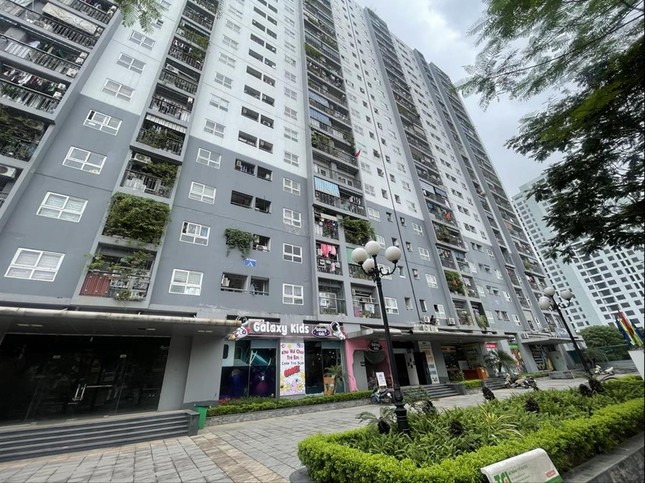Unattractive Interest Rates
A representative from the State Bank of Vietnam stated that since April 2023, the State Bank has adjusted the preferential credit package interest rates of VND 120 trillion twice. Specifically, the preferential lending interest rate for investment in social housing has been reduced from 8.5% per annum (April 2023) to 8.2% per annum (July 2023), and 8% per annum since the beginning of 2024.
Similarly, the interest rates for homebuyers have also been adjusted, decreasing from 8% per annum to 7.7% per annum and 7.5% per annum. However, the current lending of the VND 120 trillion preferential package is very low, with only VND 531 billion disbursed after one year of implementation. This amount is much lower than the demand for social housing loans.
According to Nguyen Van Dinh, Chairman of the Vietnam Real Estate Brokers Association, the interest rates of 7.5 – 8% per annum for both homebuyers and social housing investment enterprises are still high because the profits from social housing business are limited to 10%, lower than commercial housing.

NoXH Dai Kim – Hoang Mai – Hanoi Photo: (Source)
According to Mr. Dinh, it is important to recognize that social housing investment is for the social welfare of the State, and therefore, the State should be involved. Encouraging businesses to invest in social housing requires the State to provide favorable capital and land access mechanisms to attract their participation.
“The 8% annual interest rate, while it takes 1.5-2 years to complete a social housing project from the groundbreaking stage, means that businesses have to bear various costs. If they borrow from banks, the project’s capital costs will also be over 10%. Meanwhile, the profit margin of a social housing project is only 10%, so there is a risk of loss for businesses investing in social housing,” said Mr. Dinh.
According to a report from the Ministry of Construction, although some key localities have a high demand for social housing, investment is still limited compared to the target of 1 million social housing units by 2025.
Nguyen Chi Thanh, CEO of West Lake International Tower Company, believes that it is unreasonable for low-income people who want to borrow to buy social housing to have to pay a “preferential” interest rate of 7.5% per annum when the average deposit interest rate of the general population in commercial banks is currently about 4% per annum. “If it is for the purpose of supporting low-income people to buy social housing, the preferential lending should be maintained at a lower interest rate or equivalent to the mobilization interest rate of the banks. The current preferential lending rate of 7.5% per annum is not reasonable,” Mr. Thanh said.
According to Mr. Thanh, the majority of low-income workers cannot afford the current interest rate of 7.5% per annum to buy social housing. The preferential loan interest rate for homebuyers from the VND 120 trillion package should be maintained at around 5% per annum. This loan interest rate should also be kept stable for a long period to support people, instead of being limited to 5 years as it is now.
Tran Dinh Quan, Sales Director of Evergreen Trang Due Social Housing Project (Hai Phong), said that businesses are currently using their own capital and capital collected from customers. “We have also submitted preferential loan applications, but the banks are not enthusiastic about lending for this type of housing. In order to expedite the disbursement of credit packages, focus should be placed on reducing the interest rates further for homebuyers,” Mr. Quan said.
Decisive Action Required
In an interview with Tien Phong, real estate legal expert Nguyen Van Dinh stated that apart from the issue of preferential interest rates and capital sources, the development of social housing also depends on land funds and legal procedures.
According to Mr. Dinh, the current procedures for social housing are more complex and difficult than those for commercial housing. “The legal process for implementing social housing takes about 2 years, from the initial procedures to the groundbreaking stage. In addition, the current procedures nationwide involve the selection of investors for social housing projects. According to regulations, if the State allocates land for social housing, it will go through bidding if there are 2 or more investors registered. If there is only one investor, direct allocation is made. However, bidding for social housing projects is also challenging. Despite the issuance of Circular 09/2021 by the Ministry of Construction guiding the selection of investors for social housing, it is hardly implemented because there are no clear criteria,” Mr. Dinh said.
Mr. Dinh affirmed that it will be difficult to build 120,000 social housing units by 2024. It requires a very high level of political will from state agencies, monitoring roles of ministries and branches, especially the Ministry of Construction, and decisive action from local authorities and proactive participation from businesses to achieve this target. Along with that, the involvement of related organizations such as the State Bank of Vietnam and commercial banks is essential to hope for solving the “challenging problem” assigned by the Government.
“With such low income, people can only afford to rent houses. The state should support affordable rental housing instead of selling houses at low prices as it is now. Therefore, the social housing program needs to change in a way that the State supports businesses with land and capital to build social housing while also supporting low-income people to rent affordable social housing. This support should be non-refundable, not a preferential loan. Only in this way can the limitations, even malfeasance and inequality of the current social housing program be overcome,” said Mr. Anh.












